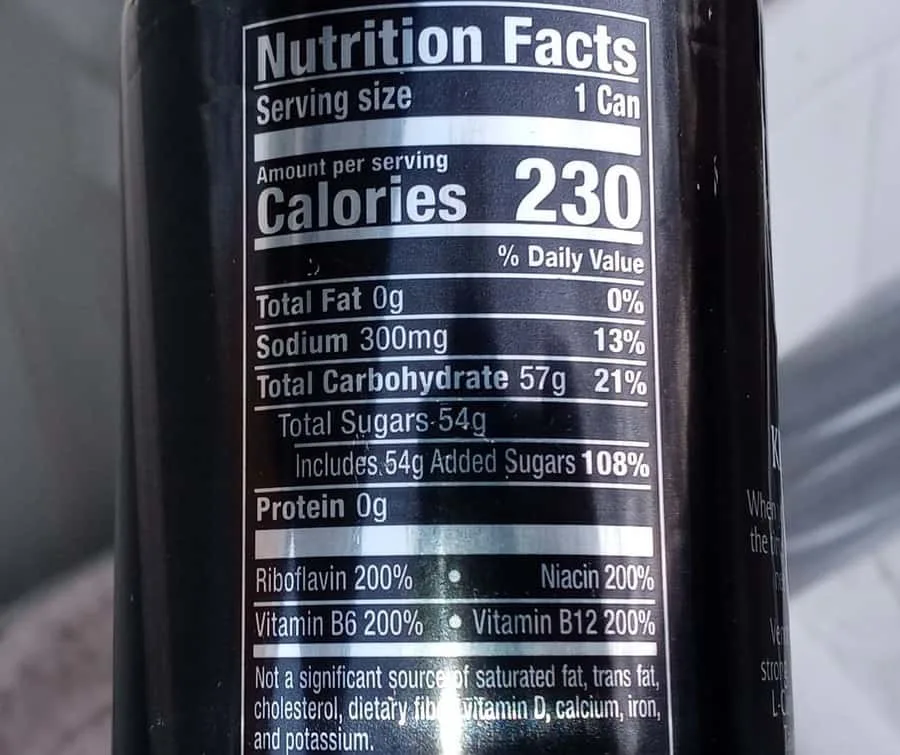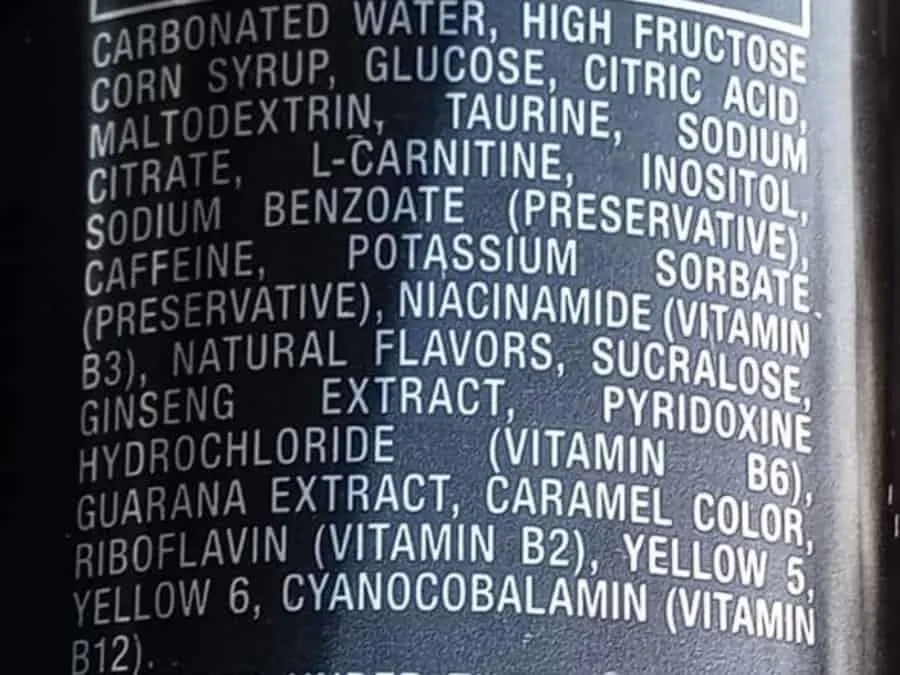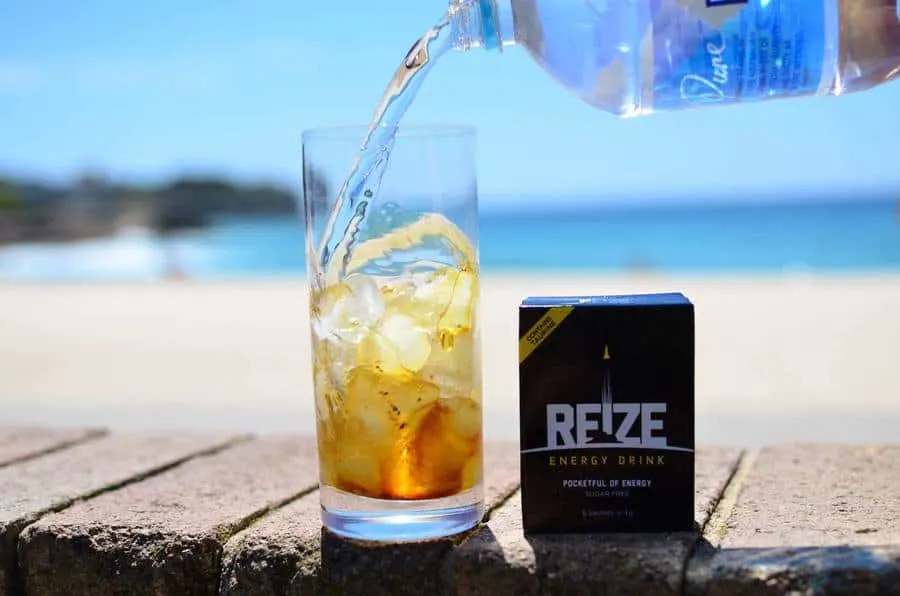Made by the same company that makes Dr Pepper, Venom Energy is a typical sugary energy drink, featuring caffeine, B vitamins, and probably a little more sugar than necessary.
But what exactly goes into these cans and how are they nutrition-wise?
In summary, a 16 fl. oz can of Venom Energy has 230 calories, 160mg of caffeine, and 54g of sugar, along with some B-Vitamins and various other nutrients.
If you want a more in-depth analysis of the caffeine and other ingredients that go into a can of Venom Energy, read on – you’re in the right place.
Let’s get started..
Venom Energy Nutrition Facts
For starters, let’s look at the basic nutritional facts of both the Regular and Low-Calorie version of a 16 fl. oz can of Venom Energy Drink:
| Typical Values | Venom Low-Calorie (16 fl. oz) | Venom Low-Calorie (16 fl.oz) |
| Energy | 230 calories | 10 calories |
| Protein | 0g | 0g |
| Fat (Of which Saturated) | 0g (0g) | 0g (0g) |
| Carbohydrate (Of which Sugars) | 57g (54g) | 1g (0g) |
| Sodium | 300mg | 310mg |
| Caffeine | 160mg | 160mg |
| Riboflavin | 3.2mg | 3.2mg |
| Vitamin B3 (Niacin) | 36mg | 36mg |
| Vitamin B6 | 4mg | 4mg |
| Vitamin B12 | 12μg | 12μg |

Venom Energy Calories
There are 230 calories per 16 fl. oz can of Venom Energy, which is definitely a lot of calories for an energy drink.
If you long for the good old days when energy drinks were chock full of sugar, Venom certainly has you covered.
Considering that the recommended daily calorie intake is around 2000 calories for women and 2500 calories for men, the fact that a can of Venom has almost 1/10th of your daily requirements is pretty startling.
That’s a lot of calories to burn, even if you live a relatively healthy lifestyle. You should definitely consider opting for another brand if you want to stay on the healthier side of things.
But if you really need to raise your blood sugar, and give yourself a quick burst of easy energy, then, Venom should suit you just fine, just be sure not to have too many cans back-to-back.
As a quick side note, even with the high amount of calories, a can of Venom isn’t exactly a suitable replacement for a full and nutritious meal, as it really doesn’t have a well-rounded set of nutrients.
So if you’re feeling hungry, go for a healthy meal instead of an energy drink; it’ll work out better in the long run.
Alternatively, if you would like something that won’t throw your appetite out of whack, check out the article I’ve written on the best zero-calorie energy drinks, where you can find some healthier alternatives.
Venom Energy Drink Ingredients
Here’s a list of Venom Energy’s ingredients:
- Carbonated Water
- High Fructose Corn Syrup
- Glucose
- Citric Acid
- Maltodextrin
- Taurine
- Sodium Citrate (Preservative)
- L-Carnitine
- Inositol
- Sodium Benzoate (Preservative)
- Potassium Sorbate (Preservative)
- Niacinamide (Vitamin B3)
- Natural Flavors
- Sucralose
- Ginseng Extract
- Pyridoxine Hydrochloride (Vitamin B6)
- Guarana Extract
- Caramel Color
- Riboflavin (Vitamin B2)
- Cyanocobalamin (Vitamin B12)

Analysis of Venom Energy Drink Ingredients
High-Fructose Corn Syrup
High-Fructose Corn Syrup (HFCS) is an artificial sugar that is one of the unhealthiest ingredients present in Venom Energy.
While HFCS does improve the taste of Venom, there are plenty of reasons why HFCS is bad for you when taken in excess, such as:
- Adding an Unnatural Amount of Fructose to Diet
- Increasing the risk of fatty liver disease
- Increasing the risk of obesity
- Increasing the risk of weight gain
- Linked to diabetes
- Contains no essential nutrients.
While this sounds pretty bad, we can assume there isn’t an unsafe amount of HFCS present in a single can, so as long as you’re not chugging down 2 to 3 cans of Venom a day, HFCS shouldn’t be that much of a risk.
Taurine
Taurine is an amino acid that’s often added to energy drinks, including Venom, and it’s noted to have many potential benefits.
Taurine is a pretty common ingredient in various energy drinks, though Red Bull‘s taurine is the most well-known, mostly due to the various rumors surrounding its source.
As for how effective taurine actually is, the science doesn’t really prove that there are immediate benefits from having taurine, so you should probably take any potential taurine benefits with some scepticism.
Inositol
Inositol is a vitamin-like substance created in the body that is responsible for maintaining chemical balance as well as assisting the function of insulin.
While it supposedly has a positive effect on the nervous system, we don’t know how much inositol is present in Venom. Hence, we can’t really come to a definite conclusion as to if it’s really effective or not in this case.
L-Carnitine
L-Carnitine is an amino acid that’s produced in the body, which helps turn fat into energy.
A pretty sufficient amount of it is already produced by the body, so if you’re a relatively healthy individual, the possible benefits you might get from its presence in Venom Energy are likely pretty minimal.
In addition, we have no idea how much L-Carnitine is actually present in Venom, so it’s hard to tell if there are sufficient amounts to work as a dietary supplement.
On the bright side, this also means that there’s probably not enough present to cause you any serious harm, so that’s definitely a plus.
Maltodextrin
Maltodextrin is a thickener and preservative which adds a dietarily insignificant amount of sugar, though even small amounts can raise your overall blood sugar levels.
Since there’s already a high amount of sugar present in Venom, maltodextrin isn’t really an issue considering there are already plenty of other things present in Venom to raise your blood sugar.
However, you might want to keep the additional sugar maltodextrin contains in mind if you ever happen to come across a sugar-free energy drink with maltodextrin present.
Ginseng and Guarana Extracts
Guarana is a plant native to Brazil that boasts an impressive range of stimulants (caffeine, theophylline, and theobromine) and various antioxidants.
Research suggests that it both reduces fatigue and also gives you a quick boost, which isn’t exactly surprising when you consider that a majority of guarana’s composition is actually caffeine,
While you may know ginseng as a traditional herb, it has plenty of possible benefits, including:
- anti-inflammatory properties
- improved brain function
- boosting your immune system
- increase energy levels
- lowering of blood sugar
Both these ingredients are definitely nice to have in an energy drink, but considering we don’t know how much of either extract is actually in Venom Energy, it’s best to take their benefits with the help of salt.
B-Vitamins
B-Vitamins are a staple in any energy drink, and, of course, they’re present in Venom Energy as well.
Although not as potent as actual B-Vitamin supplements, the B-Vitamins’ presence in Venom Energy is definitely appreciated, giving you some well-needed nutrients amidst all the sugar.
Here’s a table listing the B vitamins in Venom, but if you still want more information on B-Vitamins, click on the link to see a handy resource created by Harvard.
| Purpose | Amount per l6 fl.oz | Tolerable Upper Intake Level | |
| Vitamin B2 | assists in cell growth, energy production and breakdown of fats | 3.2mg | – |
| Vitamin B3 (Niacin) | helps the body release energy; keeps skin healthy | 36mg | 35mg |
| Vitamin B6 | store energy from protein and carbohydrates; formation of red blood cells | 4mg | 100mg |
| Vitamin B12 | release energy from food; forms red blood cells; keep the nervous system healthy | 12µg | – |
How Much Caffeine Is In Venom Energy?
There’s 160mg of caffeine in each 16 fl. oz can of Venom Energy Drink, which is actually pretty average for an energy drink of its size.
For context, a 16 fl. oz Rockstar and Monster both also have 160mg in them too – the same as Venom.
Personally, I like my energy drinks to have somewhere between 50 to 100mg of caffeine per serving, which is just the right amount to give me a nice energy boost, but not so much that it might be detrimental.
While Venom’s 160mg of caffeine is higher than what I would usually prefer, that’s not to say that you might not find it beneficial or even enjoyable, especially since everyone has a different caffeine metabolism.
As always, the FDA recommends a daily caffeine limit of no more than 400mg per day, as too much caffeine may lead to some serious side effects, such as:
- Insomnia
- Shakiness
- Anxiousness
- Increased Heart Rate
- Stomachaches
- Nausea
- Headaches
So, be sure to not double down on Venom with other caffeinated beverages such as coffee or tea, or else that energy boost might end up as a mild headache if you’re not careful.
How Much Sugar Is in Venom Energy Drink?
Every 16 fl. oz can of Venom Energy has 54g of sugar, which is on the higher end of the sugary energy drinks spectrum.
54g is about 4½ tablespoons of sugar, which is a lot more than what you should be having in a full day, let alone in a single can.
And given that the AHA recommends a daily added sugar limit of 25g for women and 36g for men, a can of Venom Energy is definitely not the healthiest thing you could be having as a pick-me-up.
If you happen to be diabetic, it’s safe to say that you should probably avoid Venom Energy and opt for some healthier options instead.
In the long term, having too much sugar over a long period of time can lead to some serious health problems, most notably:
- Weight Gain
- Type II Diabetes
- Increased risk of heart disease
- Acne
- Increased risk of depression
Plus, the high sugar content means you are almost definitely going to end up with a sugar crash when Venom Energy wears off, which isn’t something you want to experience, especially if you still need to stay alert for longer.
In any case, be sure you know what you’re getting yourself into when choosing Venom, and always be mindful of your health when you’re indulging in any energy drinks, regardless of the brand.
Does Venom Energy Use Artificial Sweeteners?
In addition to the high amount of sugar, there’s also an artificial sweetener present in Venom Energy, namely sucralose.
As sucralose is a zero-calorie sweetener, it won’t affect your overall diet due to the lack of calories, which is why it’s often used in sugar-free energy drinks to add sweetness despite the lack of sugar.
However, since there’s already so much sugar present in Venom Energy, the zero-calorie benefit of sucralose is rendered rather useless.
In any case, while controversies surrounding artificial sweeteners do exist, the FDA has approved them for general use, so you should be fine as long as you have them in moderation.
Besides, it’s probably the actual sugar content in Venom that you should be worried about instead.
It’s actually kind of rare to see an energy drink use both regular sugar and also use artificial sweeteners. It’s not something unique to Venom, but it’s not very common, especially when there’s already so much regular sugar included in the ingredients list.
What are the side effects of Venom Energy Drink?
Frequent consumption of Venom Energy drinks puts you at risk for restlessness, headaches, abnormal heart rhythm and dehydration.
Side effects may vary however per person, and it all depends on tolerance and lifestyle.
Venom is not considered to be the strongest energy drink based on its caffeine content of 160mg, therefore unless you are someone that low caffeine tolerance, side effects are not a cause for concern.
It is important however that you follow a strict diet and an active lifestyle if you desire to consume Venom regularly.
Venom Energy Flavors
There’s only a handful of notable Venom Energy flavours available, and I’ve listed them below:
Venom Regular
- Black Mamba
- Death Adder
- Killer Tapian
- Mojave Rattler
- Black Cherry Kiwi
Venom Low-Calorie
- Citrus
- Strawberry Apple
- Watermelon Lime
How Many Cans Of Venom Energy Should You Have A Day?
| Venom Energy Drink (16 fl.oz) | Daily Max Limit (Female/Male) | |
| Calories | 230 calories | 2000 calories/2500 calories |
| Sugar | 54g | 25g / 36g |
| Caffeine | 160mg | 400mg |
I personally suggest that you have, at the very most, one can of Venom Energy every other day, owing to its high sugar content.
There are plenty of energy drinks on the market that are suitable for daily use, but Venom, unfortunately, is not one of them in my opinion.
While the caffeine content in Venom may not be much of an issue, the high calorie and sugar content is going to cause some serious health problems, especially if you have more than one can in a single day.
Adding onto that, Venom also contains High-Fructose Corn Syrup, which isn’t a great addition if you’re looking to maintain a healthy figure.
As such, only crack open a can of Venom when you really need a sudden burst of sugar to get you going.
Venom is undeniably a tasty energy drink, but be sure not to go too overboard with it, especially if you live a fairly sedentary lifestyle.
Venom Energy Alternatives
If you’re looking for other great energy drinks that are similar to Venom, here’s a quick list to get you started:
- Bang
- Red Bull
- Reign
- Rockstar
- 3D Energy
- Celsius
- NOS
- Adrenaline Shoc
- C4 Energy
- Full Throttle
- Raze Energy
- Game Fuel
- AMP Energy
There are also some great powdered options for you to consider as well, which give you the benefit of being able to adjust the servings to your own specific taste:
- Zipfizz
- G Fuel
- Advocare Spark
- REIZE Energy Drink (my fav)
REIZE (10 out of 10)

If you don’t like all the sugar in Venom, how about an energy drink that gives you a great boost without raising your blood sugar levels?
REIZE is a powdered energy drink that comes in convenient 4g sachets. With a sensible 50mg of caffeine, it’s completely sugar-free and has only 11 calories per serving.
REIZE also contains a smart blend of great ingredients like taurine, ginseng, and B-group vitamins to give you the perfect energy boost without the sugar crash afterwards.
The best part?
You can get REIZE shipped straight to your door for only about $1 per drink.
That’s outstanding value for money.
Try REIZE today and I’m sure you’ll agree that it’s a smarter choice than Venom Energy.

